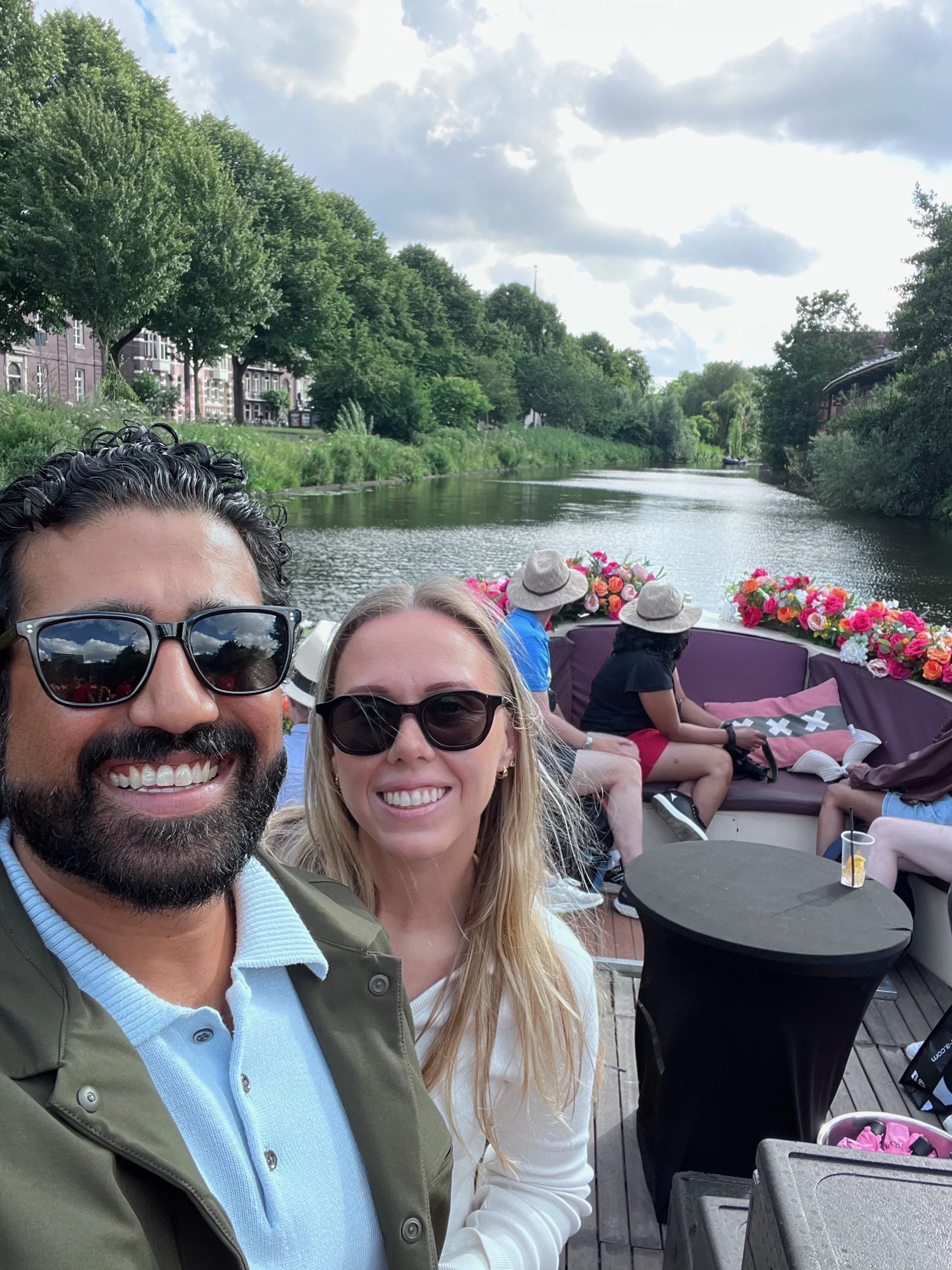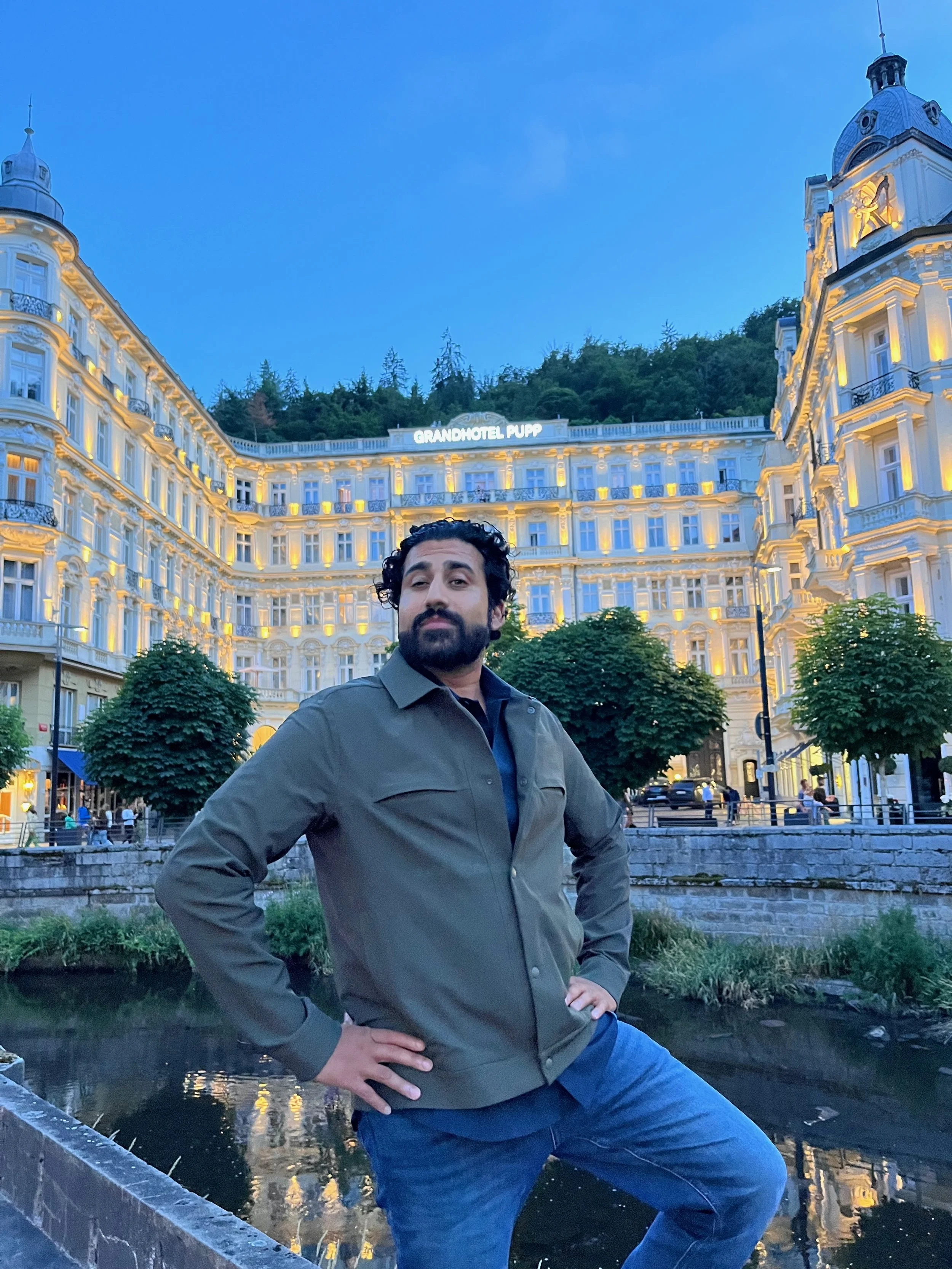Travel Hacking Europe: Our Business Class Adventure on a Budget
Our adventure began with a 10-hour layover in Zurich, giving us just enough time to get a taste of Switzerland before our flight whisked us away to Prague. From Prague, we hopped on a 1.5-hour bus ride to a place Katie has dreamed about since she was 13 years old: the magnificent Grandhotel Pupp in Karlovy Vary.
If the name sounds familiar, you might be a fan of the movie Last Holiday (2006), starring Queen Latifah. That grand, elegant hotel where Georgia Byrd finds herself?
That’s the Grandhotel Pupp! It’s a place steeped in history, dating back to 1701, known for its stunning architecture, luxurious interiors, and therapeutic hot springs. It truly lived up to Katie’s childhood dreams, a magical, elegant escape.
You might be thinking, "Robin, a grand hotel in Europe sounds amazing, but also incredibly expensive!" And you'd be right. Grandhotel Pupp typically charges around $400 CAD a night. But here's where strategic planning comes in: I leveraged a discount code through my Whole Life Participating Insurance company, earned through regular activity with them. This fantastic perk gave us a 50% discount, bringing our two-night stay down to a total of just $391 CAD. Talk about a win!
Of course, we couldn't resist indulging in the full experience. We enjoyed a delightful dinner at the Grand Restaurant and savored a couple of cocktails at the infamous Becher's Bar. For the movie buffs out there, you'll recognize this as one of the filming locations for the James Bond movie Casino Royale. It's a place where history, glamour, and a bit of spy movie magic truly come alive.
After our fairytale stay in Karlovy Vary, we bused back to Prague. Instead of another hotel, we opted for an Airbnb. This wasn't just about being economical; it strategically placed us right in the middle of all the action and, crucially, gave us access to a washer and dryer – one of Katie's non-negotiables for packing only a carry-on bag! Smart planning for minimal luggage and maximum sightseeing.
From Prague, we journeyed to Amsterdam for two incredible nights, soaking in the canals, the vibrant culture, and all the unique sights that the city has to offer. And then, it was time for the long haul home, flying business class with American Airlines – another testament to leveraging those hard-earned points.
You might be wondering how we pulled off such a trip. Well, it started with a Boxing Day deal that was too good to pass up. We found an incredible offer on Roame Travel allowing us to book business class tickets with Swiss Airlines for just 70,000 Aeroplan points and $96 CAD for taxes and fees per person! That's right, business class for less than a hundred bucks in taxes each. That's the power of strategic points accumulation, folks!
Even though we snagged amazing deals, travel still comes with costs. But just because you're on vacation doesn't mean your financial discipline goes out the window! Katie and I believe in enjoying these special moments without financial stress down the road. That means staying mindful of our spending, even while indulging a little.
Here's a snapshot of our entire European trip budget and actual spending from July 15th to July 23rd:
| Date | Flights (CAD) | Accommodation (CAD) | Food/Drink (CAD) | Transportation/Uber (CAD) | Ticket/Entertainment (CAD) | Other (CAD) | Points (Aeroplan / Alaska / Bonvoy) | Total CAD Cash Spent |
|---|---|---|---|---|---|---|---|---|
| July 15 | 276.94 | 0 | 0 | 0 | 0 | 0 | 140,000 Aeroplan | 276.94 |
| July 16 | 0 | 97.73 | 68.18 | 37.98 | 0 | 14.12 | 0 | 218.01 |
| July 17 | 0 | 391.33 | 210.65 | 30.63 | 0 | 0 | 0 | 632.61 |
| July 18 | 0 | 0 | 448.76 | 24.62 | 0 | 0 | 0 | 473.38 |
| July 19 | 0 | 263.86 | 176.65 | 30.63 | 0 | 0 | 0 | 471.14 |
| July 20 | 0 | 0 | 157.47 | 51.86 | 19.37 | 0 | 0 | 228.70 |
| July 21 | 95.20 | 0 | 62.41 | 48.06 | 0 | 0 | 41,000 Bonvoy | 205.67 |
| July 22 | 0 | 0 | 201.38 | 0 | 0 | 102.36 | 90,000 Alaska | 303.74 |
| July 23 | 368.84 | 0 | 0 | 21.42 | 0 | 0 | 0 | 390.26 |
| TOTAL | 740.98 | 752.92 | 1325.5 | 193.34 | 0 | 154.22 | 140,000 Aeroplan, 90,000 Alaska, 41,000 Bonvoy | 3200.05 |
Beyond the cash we spent, the real magic of this trip was unlocked by strategic points accumulation. Let's break down the approximate cash value of what these point redemptions would have cost us if we paid cash:
YYZ to Prague (Swiss Airlines Business Class): For two people (140,000 Aeroplan points), this flight would typically cost CAD 3,000−C5,000+ per person in cash, making the total estimated cash value for our flights CAD 6,000−C10,000+. Using C$6,000 per person as a conservative estimate, that's roughly 8.57 cents per point redemption for our Aeroplan points.
AMS to YYZ (American Airlines Business Class): For two people (90,000 Alaska Airmiles, 45k each), a one-way business class ticket on American Airlines across the Atlantic can easily range from US3,000−US5,000+ per person. Converting this to CAD (using an approximate 1.37 CAD/USD exchange rate), that's roughly CAD 4,100−C6,800+ per person. Using C$4,100 as a conservative estimate, that's approximately 9.11 cents per point redemption for our Alaska Airmiles.
Sir Adam Hotel, Amsterdam (2 nights): The 41,000 Marriott Bonvoy points used for our stay at the Sir Adam Hotel could have cost anywhere from CAD 400−C800+ per night, depending on the season and specific dates. For two nights, that's an estimated cash value of CAD 800−C1,600+. For our 41,000 points, that's roughly 2.24 cents per point redemption. (Hotels generally offer lower redemption values compared to flights, but still significantly better than statement credits or gift cards.)
That's a rough total estimated value of over CAD 15,000 to CAD 25,000+ in travel value that we primarily redeemed using points! This dramatically reduced our out-of-pocket expenses for the most expensive parts of the trip, allowing us to allocate our cash budget towards incredible experiences, food, and local exploration. This is the power of mastering the points game – it's a huge component of truly financially fulfilled travel.
Okay, so you've seen how powerful travel points can be for those big bucket-list trips. But the smart use of credit cards and loyalty programs goes way beyond just flights and hotels. This is where you can squeeze extra value out of your everyday spending and build a hidden safety net for yourself.
Many healthcare professionals simply use one or two cards without fully optimizing them. But understanding the different types of rewards can significantly impact your financial health:
Cash Back Cards: These are straightforward; you earn a percentage of your spending back as cash. Some cards offer higher percentages in specific categories like groceries, gas, or recurring bills. This can directly offset your monthly expenses, essentially putting money back in your pocket.
Canada: CIBC Dividend® Visa Infinite*, Scotia Momentum® Visa Infinite*, Rogers Red World Elite® Mastercard*
USA: Citi Double Cash® Card, Wells Fargo Active Cash® Card, Blue Cash Preferred® Card from American Express.
(My wallet pick: CIBC Costco Mastercard)
Travel Points/Miles Cards (Beyond Airlines/Hotels): Even if you're not a frequent flyer, many general travel points cards offer flexible points that can be used for any travel expense (flights, hotels, car rentals, even experiences) or converted to cash/statement credits.
Canada: American Express Cobalt® Card (very versatile!), CIBC Aventura® Visa Infinite*, Scotiabank Gold American Express® Card. (
USA: Chase Sapphire Preferred® Card, Capital One Venture X Rewards Credit Card, American Express® Gold Card.
My wallet picks:
American Express Cobalt® Card (for groceries and dining),
American Express Personal Platinum (for Hilton/Marriott Status, Priority Pass Airport Lounge and incredible insurance coverage),
American Express Aeroplan Reserve (for Air Canada flights and stacking Aeroplan points),
American Express Marriott Bonvoy (for hotel stays))
Overlooked Insurance Benefits: This is a goldmine of value most people ignore! Many premium credit cards come with built-in insurance coverage that can save you thousands:
Travel Medical Insurance: Crucial for emergencies when traveling.
Car Rental Collision/Loss Damage Waiver: Can save you from buying expensive insurance at the rental counter.
Trip Cancellation/Interruption Insurance: Protects your non-refundable bookings if plans change unexpectedly.
Flight Delay/Baggage Delay Insurance: Reimburses you for essential expenses during travel disruptions.
Purchase Protection/Extended Warranty: Covers items bought with the card against loss, theft, damage, or extends the manufacturer's warranty.
The Golden Rules for Maximizing Rewards (Without Falling into Debt):
Pay Your Balance in Full, ALWAYS: This is non-negotiable. The interest charges will quickly negate any rewards earned.
Understand Your Spending Habits: Choose cards that reward you most for where you already spend money (groceries, gas, travel, dining).
Use It or Lose It (Strategically): Some cards with annual fees offer rewards and benefits that can easily outweigh them if you utilize them.
Read the Fine Print: Understand annual fees, interest rates, foreign transaction fees, and any limitations on rewards or insurance.
Optimizing your credit card usage is a key part of the financially fulfilled life. It's about being smart with your everyday spending to unlock hidden value that fuels your experiences, saves you money, and provides a layer of security.
This trip, with all its planning, spontaneity, and tracking, reinforced some core financial principles that apply whether you're traveling the world or just navigating your daily life:
The Power of Points: Strategic use of credit card points and loyalty programs can turn aspirational travel (like business class flights and even luxury hotel stays with discounts!) into reality without draining your cash savings. This is a game-changer for those big-ticket experiences.
Prioritize What Matters: We invested in experiences and special accommodations (like the Grandhotel Pupp) because those were high-value priorities for us. We balanced this by being savvy with other costs, like choosing an economical Airbnb in Prague that even offered laundry facilities (a small win that makes a big difference when packing light, cough Katie cough).
Budgeting Isn't Restrictive, It's Liberating: Having a budget isn't about saying "no" to fun; it's about enabling the "yes!" By tracking our spending in real-time, we could adjust as we went, ensuring we stayed within our comfortable limits. This mindfulness allowed us to enjoy every moment without future financial stress.
Flexibility is Key (and So is Knowing Your Needs): Opting for a short bus ride from Prague to Karlovy Vary, or choosing an Airbnb for its practical amenities, highlights the importance of tailoring your choices to your actual needs and budget, rather than just following a standard itinerary.
This trip has been a powerful reminder that financial planning isn't just about accumulating wealth; it's about using that wealth (and those smart strategies!) to enhance your life, create lasting memories, and build a financially fulfilled future.





